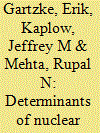| Srl | Item |
| 1 |
ID:
131240


|
|
|
|
|
| Publication |
2014.
|
| Summary/Abstract |
A substantial literature examines the causes of nuclear proliferation, but few studies have addressed why states decide on a particular portfolio of weapon systems once they have acquired a basic nuclear capability. We advance a portfolio theory of nuclear force structure, positing that states seek a diverse set of capabilities for nuclear deterrence, but that they also face major resource and organizational constraints. A number of factors may help to explain the portfolio of nuclear forces that states ultimately field, including resource availability, experience as a nuclear power, bureaucratic politics, the conventional threat environment, the presence of nuclear rivals, and the maintenance of nuclear alliances. We test the influence of these factors on force structure using a new data set of nuclear weapon platforms fielded by nine nuclear nations between 1950 and 2000. Our findings represent an important step in understanding the drivers of nuclear behavior after states have joined the nuclear weapons club.
|
|
|
|
|
|
|
|
|
|
|
|
|
|
|
|
| 2 |
ID:
146181


|
|
|
|
|
| Summary/Abstract |
Why do some parties to intrastate conflict refuse to negotiate? I propose a simple theory of civil conflict in which the act of negotiation itself carries costs and benefits. Several hypotheses follow: parties to civil conflict will avoid negotiation when they (1) fear alienating external supporters or internal constituencies, (2) risk granting legitimacy to their opponents or signaling weakness to other potential claimants, or (3) find it difficult to identify reliable negotiating partners. Empirical tests find support for my argument. My findings suggest that cases exist in which the parties would reach an agreement if only they could overcome the costs of negotiation and engage in talks. Diplomats and mediators should consider the costs and benefits of talks when planning the timing and form of interventions designed to bring parties to the table.
|
|
|
|
|
|
|
|
|
|
|
|
|
|
|
|
| 3 |
ID:
131237


|
|
|
|
|
| Publication |
2014.
|
| Summary/Abstract |
A growing literature suggests that nuclear assistance from other countries is an important determinant of whether states pursue nuclear weapons. Existing work does not consider, however, the most widely available source of assistance-the Technical Cooperation (TC) program administered by the International Atomic Energy Agency (IAEA). IAEA assistance is an important piece of the nonproliferation regime's central bargain: member states enjoy nuclear assistance in exchange for agreeing not to seek nuclear weapons. Using a data set of TC projects since 1972, we examine whether international nuclear assistance is associated with the pursuit of nuclear weapons. We hypothesize that some TC assistance reduces the cost of pursuing nuclear weapons, making weapons programs more likely. We find that receiving TC related to the nuclear fuel cycle is a statistically and substantively significant factor in state decisions since 1972 to seek nuclear weapons, with important implications for existing theories of nuclear proliferation.
|
|
|
|
|
|
|
|
|
|
|
|
|
|
|
|